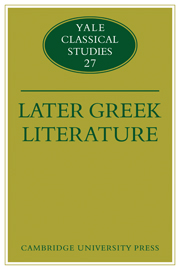Book contents
- Frontmatter
- Contents
- Introduction
- Theme, structure and narrative in Chariton
- The importance of sophists
- Lucian: a sophist's sophist
- The mendacity of Kalasiris and the narrative strategy of Heliodoros' Aithiopika
- The Emperor Julian on his predecessors
- Greek translations of Latin literature in the fourth century A.D.
- The empress and the poet: paganism and politics at the court of Theodosius II
- Pastiche, pleasantry, prudish eroticism: the letters of ‘Aristaenetus’
- The date and purpose of the Philopatris
Lucian: a sophist's sophist
Published online by Cambridge University Press: 06 December 2010
- Frontmatter
- Contents
- Introduction
- Theme, structure and narrative in Chariton
- The importance of sophists
- Lucian: a sophist's sophist
- The mendacity of Kalasiris and the narrative strategy of Heliodoros' Aithiopika
- The Emperor Julian on his predecessors
- Greek translations of Latin literature in the fourth century A.D.
- The empress and the poet: paganism and politics at the court of Theodosius II
- Pastiche, pleasantry, prudish eroticism: the letters of ‘Aristaenetus’
- The date and purpose of the Philopatris
Summary
Lucian is without doubt the most readily accessible of Second Sophistic authors; he exploits a wide cross-section of the movement's resources and capabilities, and he is a better advertizement for its achievements than most of its other surviving practitioners. He is also an author whose appeal is direct, and that has made it tempting to form facile judgments about him, and through him, of his age as a whole. My aim is to look briefly at several characteristic links between the sophist and his movement, and to note some of the pitfalls in passing judgment on either.
A sophist's choice of media
Part of Lucian's success undoubtedly lies in his lightness of touch, which often amounts to sleight of hand. He was a rhetorician who did not feel compelled to take the standard priorities of rhetoric very seriously: almost the whole of his output can be related to the elementary exercises, the progymnasmata, of the rhetorical schools, and it is the signal service of Bompaire to have explained his output largely in terms of the basic curriculum. But we should also note where Lucian's interests lie within that curriculum: this will supply the key to his literary personality.
The simplest of rhetorical exercises was no more than the re-telling of a story (mythos or diēgēma); Lucian himself has a predilection for it. Almost all the laliae contain at least one if not two self-contained narratives, so that storytelling accounts for most of Bacchus, Hercules, de Electro, Herodotus, Zeuxis, Prometheus es, Dipsades, Harmonides, and Scytha.
- Type
- Chapter
- Information
- Later Greek Literature , pp. 61 - 92Publisher: Cambridge University PressPrint publication year: 1982
- 1
- Cited by



